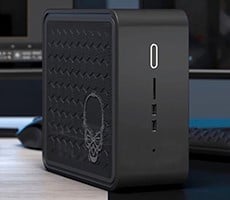In the following benchmark we're specifically pitting Intel's integrated graphics in the
Broadwell,
Haswell, and
Skylake CPUs against similar solutions from AMD APUs.
|

|
| Futuremark 3DMark Fire Strike |
| Synthetic DirectX Gaming |
|
3DMark Fire Strike has two benchmark modes: Normal mode runs at 1920x1080, while Extreme mode targets 2560x1440. GPU target frame buffer utilization for normal mode is 1GB and the benchmark uses tessellation, ambient occlusion, volume illumination, and a medium-quality depth of field filter. The more taxing Extreme mode targets 1.5GB of frame buffer memory and increases detail levels across the board. For the following tests, we ran the benchmark in Normal mode since we were testing integrated graphics solutions and not high-end discrete GPUs. There's simply no way these little rigs would ever be used for Extreme gaming.





The Gigabyte
Brix S GB-BSi5HT-6200 finished right about in the middle of the pack in Fire Strike. Intel's HD 520 series graphics in the
Skylake-based Core i5-6200U squeeked in just ahead of some of the Haswell and Broadwell-based processors with HD 5x and 6x series graphics. But it couldn't touch the more powerful Iris Pro 5200.
Graphics performance looked a little better in the Cinebench R15 OpenGL test. Here, the Gigabyte Brix S GB-BSi5HT-6200 trailed only the Core i7-based previous-gen Brix with
Iris Pro graphics.
 4K Deadpool Trailer Streaming From YouTube Over WiFi
4K Deadpool Trailer Streaming From YouTube Over WiFi
We also played various media file types on the Gigabyte Brix S GB-BSi5HT-6200, including MP4, MKV, and AVI files residing locally on the system, being accessed over the network from a
NAS (using WiFi and wired Ethernet), and streamed from the web. We experienced no issues and realized low CPU utilization with all Full HD content. Streaming 4K content from
YouTube worked perfectly as well. Above is a screencap of the 4K Deadpool trailer streaming from Youtube, with the desktop resolution set to 1080P, streaming over WiFi. You can see the spikes in WiFi utilization as Youtube caches content, but CPU utilization remains low throughout.














